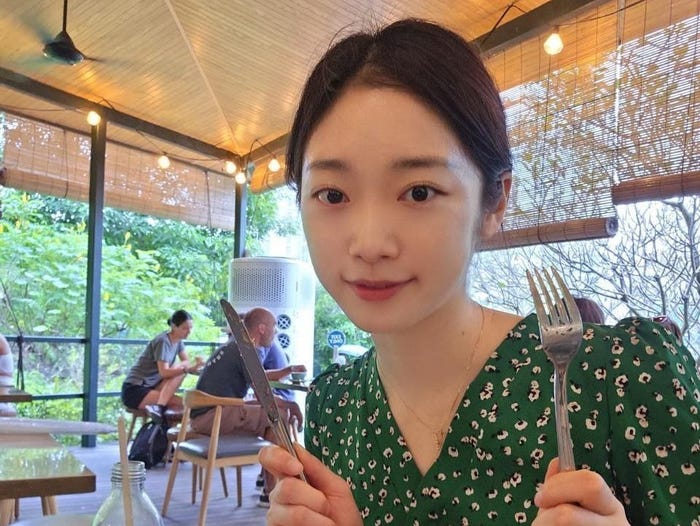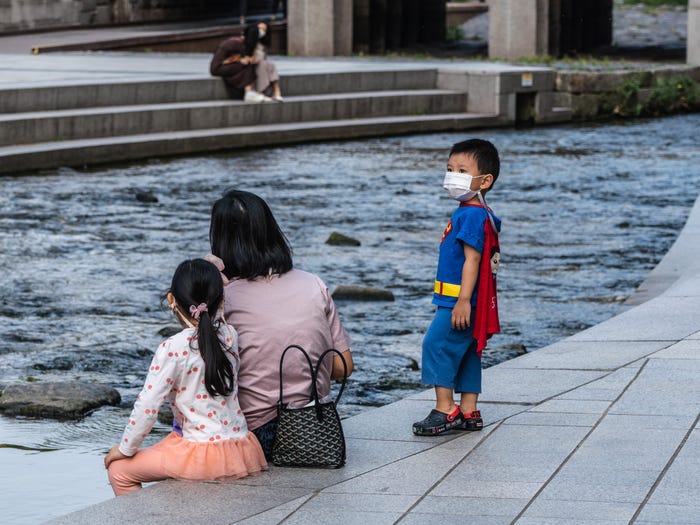Meet The Typical South Korean Millennial: Educated, Overqualified for The Job Market, and Part of The 'kangaroo tribe' That Can't Afford to Leave Their Parents' Homes
https://www.businessinsider.com/south-korea...ons-jobs-2023-3

-Almost 70% of South Korea's millennials have college degrees.
-But they're overqualified for the labor market, resulting in a high unemployment rate.
-Known as the "kangaroo tribe," many still live with their parents because of high housing costs.

Kim So-hee works at Samsung Electronics as an engineer
Kwon graduated in 2022 from Yonsei University, a top college where he swam on the varsity team and earned a double degree in physical education and public administration. He lives in Gangnam — Seoul's glitzy city center — in a four-room apartment that his family has owned for generations.
He works as a data analyst at a multinational tech firm, in a country where stable, white-collar jobs are glorified as the key to a good life. On weekends, he wins swimming competitions and is set to represent Seoul in under-30 tournaments.
But like most young and unmarried South Koreans, he lives with his parents, and despite earning more than the national average, he won't even consider buying his own home for the next 10 years. If he saves enough, maybe he can afford a car by then, he said.
"It feels a bit hopeless, like we are the damned ones," Kwon said.
Hong Seo-yoon, 36, manages a nonprofit for disabled rights in Korea and runs advocacy classes at Seoul National University in her spare time for around $3,700 a month. She's worked as an anchor at the Korean Broadcasting System and as the founder of multiple NGOs. Hong, who uses a wheelchair, also sits on the board of several Korean nonprofits for disability access.
She spent her life savings and took out a hefty loan to buy her first home in Seoul — a 600-square-foot apartment built 30 years ago — for $300,000 in 2019. Now, though, with her current salary and mortgage interest piling up, Hong told Insider she's worried about her financial future.
Kwon and Hong belong to Generation MZ, a collective term for South Korea's millennials and Gen Zers, who often get grouped together for their digital fluency and outlook on life.
Generation MZ — anyone born between 1980 and 2005 — accounts for almost a third of the country's population of around 52 million people.
It makes up Korea's most educated generation and is the country's first youth generation known for speaking up about social issues and the climate.
Generation MZ is also characterized by intense financial anxiety, as young Koreans like Hong and Kwon see their life goals drifting further away while housing, transportation, and education prices reach record highs.
Insider spoke with five South Koreans of Generation MZ, as well as finance and generational experts, to gain a better understanding of the generation.
Only 12.7% of Generation MZ singles and 36.6% MZ married couples are homeowners, according to data from Statistics Korea, the government Census agency.
By comparison, 47.8% of US millennials own homes, per an analysis of 2020 Census data by Apartment List. US millennials comprise an older age range of 27- to 42-year-olds.
That's not to say Koreans don't want to own homes. A 2020 survey of 2,889 Koreans in their 20s found that nearly 95% think purchasing a house is essential. Kwon, the data analyst, said owning property is enshrined as a sign of status for most Koreans.
But Kwon, who makes $60,000 a year, doesn't know if he'll ever buy his own house.
"In terms of my limit, if I'm not married, maybe I'll move out and rent a place when I'm 35 or 36," Kwon said. He said he saves 70% of his income by staying with his parents.
The average home sale price in Seoul was $876,215 in 2022, compared to average salaries of $26,600 to $37,660 for Koreans between the ages of 25 to 39, the Ministry of Employment and Labor has reported.
With soaring housing costs and rising bank interest rates, many young and unmarried South Koreans don't have the funds to seriously consider being homeowners. The Korea Financial Times reported that middle-income households can afford only 2.6% of the houses in Seoul.
It's why they call themselves the "kangaroo tribe," a reference to baby kangaroos, or joeys, known for being late to leave their mother's pouch. At least 42.5% of Generation MZ still live with their parents, according to a 2022 report by Statistics Korea.
In Korea, it's socially acceptable to sacrifice one's independence for the practical gain of avoiding rental costs.
For Hong, the nonprofit founder, surging rental prices pushed her to take the plunge and buy her apartment with a loan. She didn't have the option of staying with her parents, who live in Changwon, a city on Korea's southeastern coast, and rental costs were rising every week in 2019, she said.
"I was so afraid that my landlord would keep asking me to increase the rental cost," she said.
In South Korea, annual college tuition averages around $5,000 a year, compared to an average of $9,377 for in-state and $27,279 for out-of-state annual tuition in the US, according to the Education Data Initiative.
Less than 30% of college students in Korea are financing their education with student loans, Eyal Victor Mamou, the CEO of the Korean consultancy Koisra, told Insider.
Park Min-jun, 25, is working on his master's degree; he rents a studio apartment in Seoul for $6,000 a year and spends around $5,400 on tuition a year. His parents live in South Korea's second-largest city, Busan, and support him with part of his expenses, he told Insider.
Most of Park's friends at his college, Seoul National University, receive cash from their parents to tide them over while they study, he said.
"The student-loan problem in Korea is not as serious as in the US, where most college graduates have to start their social lives with a heavy debt," Kim Seong-kon, a professor emeritus in cultural studies and the former dean of international affairs at Seoul National University, told Insider.
Park chips in by earning $1,100 a month waiting tables at a Korean barbecue restaurant, tutoring undergraduate students, and working as a research assistant.
He's got enough left over to spend on occasional trips to nearby holiday locations like Jeju Island, which is just a short flight from Seoul. He's currently saving up for a vacation to Indonesia. "If we had student loans at US levels, that would cause social hysteria," he said. "It's common for people to try to save up while in school."

Fewer South Koreans of Generation MZ think of marriage as a necessity.
South Korea holds the current world record for lowest birth rate.
https://www.businessinsider.com/south-korea...ons-jobs-2023-3

-Almost 70% of South Korea's millennials have college degrees.
-But they're overqualified for the labor market, resulting in a high unemployment rate.
-Known as the "kangaroo tribe," many still live with their parents because of high housing costs.

Kim So-hee works at Samsung Electronics as an engineer
Kwon graduated in 2022 from Yonsei University, a top college where he swam on the varsity team and earned a double degree in physical education and public administration. He lives in Gangnam — Seoul's glitzy city center — in a four-room apartment that his family has owned for generations.
He works as a data analyst at a multinational tech firm, in a country where stable, white-collar jobs are glorified as the key to a good life. On weekends, he wins swimming competitions and is set to represent Seoul in under-30 tournaments.
But like most young and unmarried South Koreans, he lives with his parents, and despite earning more than the national average, he won't even consider buying his own home for the next 10 years. If he saves enough, maybe he can afford a car by then, he said.
"It feels a bit hopeless, like we are the damned ones," Kwon said.
Hong Seo-yoon, 36, manages a nonprofit for disabled rights in Korea and runs advocacy classes at Seoul National University in her spare time for around $3,700 a month. She's worked as an anchor at the Korean Broadcasting System and as the founder of multiple NGOs. Hong, who uses a wheelchair, also sits on the board of several Korean nonprofits for disability access.
She spent her life savings and took out a hefty loan to buy her first home in Seoul — a 600-square-foot apartment built 30 years ago — for $300,000 in 2019. Now, though, with her current salary and mortgage interest piling up, Hong told Insider she's worried about her financial future.
Kwon and Hong belong to Generation MZ, a collective term for South Korea's millennials and Gen Zers, who often get grouped together for their digital fluency and outlook on life.
Generation MZ — anyone born between 1980 and 2005 — accounts for almost a third of the country's population of around 52 million people.
It makes up Korea's most educated generation and is the country's first youth generation known for speaking up about social issues and the climate.
Generation MZ is also characterized by intense financial anxiety, as young Koreans like Hong and Kwon see their life goals drifting further away while housing, transportation, and education prices reach record highs.
Insider spoke with five South Koreans of Generation MZ, as well as finance and generational experts, to gain a better understanding of the generation.
Only 12.7% of Generation MZ singles and 36.6% MZ married couples are homeowners, according to data from Statistics Korea, the government Census agency.
By comparison, 47.8% of US millennials own homes, per an analysis of 2020 Census data by Apartment List. US millennials comprise an older age range of 27- to 42-year-olds.
That's not to say Koreans don't want to own homes. A 2020 survey of 2,889 Koreans in their 20s found that nearly 95% think purchasing a house is essential. Kwon, the data analyst, said owning property is enshrined as a sign of status for most Koreans.
But Kwon, who makes $60,000 a year, doesn't know if he'll ever buy his own house.
"In terms of my limit, if I'm not married, maybe I'll move out and rent a place when I'm 35 or 36," Kwon said. He said he saves 70% of his income by staying with his parents.
The average home sale price in Seoul was $876,215 in 2022, compared to average salaries of $26,600 to $37,660 for Koreans between the ages of 25 to 39, the Ministry of Employment and Labor has reported.
With soaring housing costs and rising bank interest rates, many young and unmarried South Koreans don't have the funds to seriously consider being homeowners. The Korea Financial Times reported that middle-income households can afford only 2.6% of the houses in Seoul.
It's why they call themselves the "kangaroo tribe," a reference to baby kangaroos, or joeys, known for being late to leave their mother's pouch. At least 42.5% of Generation MZ still live with their parents, according to a 2022 report by Statistics Korea.
In Korea, it's socially acceptable to sacrifice one's independence for the practical gain of avoiding rental costs.
For Hong, the nonprofit founder, surging rental prices pushed her to take the plunge and buy her apartment with a loan. She didn't have the option of staying with her parents, who live in Changwon, a city on Korea's southeastern coast, and rental costs were rising every week in 2019, she said.
"I was so afraid that my landlord would keep asking me to increase the rental cost," she said.
In South Korea, annual college tuition averages around $5,000 a year, compared to an average of $9,377 for in-state and $27,279 for out-of-state annual tuition in the US, according to the Education Data Initiative.
Less than 30% of college students in Korea are financing their education with student loans, Eyal Victor Mamou, the CEO of the Korean consultancy Koisra, told Insider.
Park Min-jun, 25, is working on his master's degree; he rents a studio apartment in Seoul for $6,000 a year and spends around $5,400 on tuition a year. His parents live in South Korea's second-largest city, Busan, and support him with part of his expenses, he told Insider.
Most of Park's friends at his college, Seoul National University, receive cash from their parents to tide them over while they study, he said.
"The student-loan problem in Korea is not as serious as in the US, where most college graduates have to start their social lives with a heavy debt," Kim Seong-kon, a professor emeritus in cultural studies and the former dean of international affairs at Seoul National University, told Insider.
Park chips in by earning $1,100 a month waiting tables at a Korean barbecue restaurant, tutoring undergraduate students, and working as a research assistant.
He's got enough left over to spend on occasional trips to nearby holiday locations like Jeju Island, which is just a short flight from Seoul. He's currently saving up for a vacation to Indonesia. "If we had student loans at US levels, that would cause social hysteria," he said. "It's common for people to try to save up while in school."

Fewer South Koreans of Generation MZ think of marriage as a necessity.
South Korea holds the current world record for lowest birth rate.
